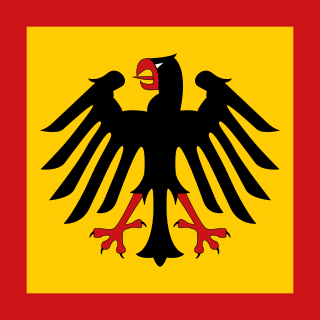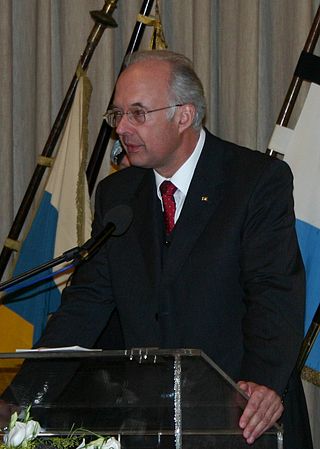Related Research Articles

Germany is a democratic and federal parliamentary republic,where federal legislative power is vested in the Bundestag and the Bundesrat.

The president of Germany,officially titled the Federal President of the Federal Republic of Germany,is the head of state of Germany.

The German Bundesrat is a legislative body that represents the sixteen Länder of Germany at the federal level. The Bundesrat meets at the former Prussian House of Lords in Berlin. Its second seat is located in the former West German capital of Bonn.

The Federal Court of Justice is the highest court of civil and criminal jurisdiction in Germany. Its primary responsibility is the final appellate review of decisions by lower courts for errors of law. While,legally,a decision by the Federal Court of Justice is only binding with respect to the individual case in which it enters,de facto the court's interpretation of the law is followed by lower courts with almost no exception. Decisions handed down by the Federal Court of Justice can only be vacated by the Federal Constitutional Court for violating a provision of the German constitution,the Basic Law.

Roland Koch is a German jurist and former conservative politician of the Christian Democratic Union (CDU). He was the 7th Minister President of Hesse from 7 April 1999,immediately becoming the 53rd President of the Bundesrat,completing the term begun by his predecessor as Minister President,Hans Eichel,until his resignation on 31 August 2010. During his time in office,Koch was widely regarded as one of Chancellor Angela Merkel's main rivals within the CDU.
Same-sex marriage has been legal in Germany since 1 October 2017. A bill for the legalisation of same-sex marriage passed the Bundestag on 30 June 2017 and the Bundesrat on 7 July. It was signed into law on 20 July by President Frank-Walter Steinmeier and published in the Federal Law Gazette on 28 July 2017. Previously,the governing CDU/CSU had refused to legislate on the issue of same-sex marriage. In June 2017,Chancellor Angela Merkel unexpectedly said she hoped the matter would be put to a conscience vote. Consequently,other party leaders organised for a vote to be held in the last week of June during the final legislative session before summer recess. The Bundestag passed the legislation on 30 June by 393 votes to 226,and it went into force on 1 October. Polling suggests that a significant majority of Germans support the legal recognition of same-sex marriage. Germany was the first country in Central Europe,the fourteenth in Europe,and the 22nd in the world to allow same-sex couples to marry nationwide.

In Germany,the President of the Bundesrat or President of the Federal Council is the chairperson (speaker) of the Bundesrat. The president is elected by the Bundesrat for a term of one year. Traditionally,the presidency of the Bundesrat rotates among the leaders of the sixteen state governments. This is however only an established practice;theoretically the Bundesrat is free to elect any member it chooses,and a president could also be re-elected. As well as acting as a chairperson,the president of the Bundesrat is ex officio deputy of the Federal President. The President of the German Federal Council is 4th in the German order of precedence. In addition,the main celebration of German Unity Day is traditionally held in the state that holds the presidency.

Paul Kirchhof is a German jurist and tax law expert. He is also a professor of law,member of the Pontifical Academy of Social Sciences and,a former judge in the Federal Constitutional Court of Germany (Bundesverfassungsgericht),the highest court in Germany.

Carlo Schmid was a German academic and politician of the Social Democratic Party of Germany (SPD).

Peter Aloysius Müller is a German politician belonging to the Christian Democratic Union (CDU). From 1999 to 2011,he has held the position of Premier (Ministerpräsident) of the state of Saarland,serving as President of the Bundesrat in 2008/09. In December 2011,Müller was elected as judge of German Bundesverfassungsgericht.

The president of the Bundestag presides over the sessions of the Bundestag,the federal parliament of Germany,with functions similar to that of a speaker in other countries. In the German order of precedence,the office is ranked second after the president and before the chancellor.

The Heidelberg University Faculty of Law,located in Heidelberg,Germany,is one of the original four constituent faculties of Heidelberg University. Founded in 1386 by Rupert I,Elector Palatine,it is the oldest law school in Germany.

Andreas Voßkuhle is a German legal scholar who served as the president of the Federal Constitutional Court of Germany from 2010 until 2020.
Angelika Helene Anna Nußberger is a German professor of law and scholar of Slavic studies,and was the judge in respect of Germany at the European Court of Human Rights from 1 January 2011 to 31 December 2019;from 2017 to 2019 she was the Court’s Vice-President. She had previously been Vice-Rector of the University of Cologne. Currently she is Director of the Institute of Eastern European Law and Comparative Law of the University of Cologne.

The Federal Constitutional Court is the supreme constitutional court for the Federal Republic of Germany,established by the constitution or Basic Law of Germany. Since its inception with the beginning of the post-World War II republic,the court has been located in the city of Karlsruhe,which is also the seat of the Federal Court of Justice.

Nils Schmid is a German lawyer and politician of the Social Democratic Party (SPD). Since 2018,he has been the SPD parliamentary group's spokesperson for foreign affairs in the German Bundestag.

Katarina Barley is a German politician and lawyer who has been a Member of the European Parliament since 2019,serving as one of its Vice-Presidents. She served as Federal Minister of Justice and Consumer Protection in the fourth Cabinet of Angela Merkel. Prior to that,she had served as Federal Minister of Family Affairs,Senior Citizens,Women and Youth and since 28 September 2017 also as the acting Federal Minister of Labour and Social Affairs,both until 14 March 2018.

Till Steffen is a German lawyer and politician of Alliance 90/The Greens who has been serving as a member of the German Bundestag since the 2021 elections,representing the Hamburg-Eimsbüttel district.

Stephan Harbarth is the president of the Federal Constitutional Court of Germany (Bundesverfassungsgericht),former German lawyer and politician of the Christian Democratic Union (CDU). From 2009 until 2018 he served as member of the Bundestag. On 22 November 2018 he was elected to the Federal Constitutional Court by the Bundestag. He succeeded Ferdinand Kirchhof and serves in the court's first senate. On 23 November 2018,one day after his election to the court,he was elected vice president of the Federal Constitutional Court by the Bundesrat. In this capacity,he is chairman of the first senate.
References
- ↑ "Justice Kirchhof website". Bundesverfassungsgericht website. Archived from the original on 3 January 2010. Retrieved 1 January 2010.
- ↑ "Vosskuhle new president of the Constitutional Court, Kirchhof elected vice president". nealine.de. Archived from the original on 19 July 2011. Retrieved 1 January 2010.
- ↑ Germany’s top court curbs political influence on public broadcaster ZDF Deutsche Welle , 25 March 2014.
- ↑ Presidium Archived 9 January 2018 at the Wayback Machine Gesellschaft für Rechtspolitik.